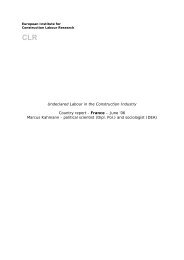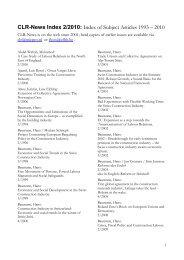Japan – what can we learn? - Construction Labour Research
Japan – what can we learn? - Construction Labour Research
Japan – what can we learn? - Construction Labour Research
Create successful ePaper yourself
Turn your PDF publications into a flip-book with our unique Google optimized e-Paper software.
consider a mechanism in which the interests of middle managers willalso be heard. It is strategically important for the unions to hear the“voice” of middle managers, because they play quite important rolesin the consensus formation at companies. Fourth, it is necessary tostrengthen efforts such as negotiations and consultations at thecorporate group-level in the light of corporate splits, the creation ofsubsidiaries and a shift to management based on consolidated accountstatements. Fifth, it is necessary to develop a more robust response tocorporate reorganisations, such as creating holding companies andcorporate mergers, while beginning to establish new rules onmanagerial relations.3.2 The role of trade unions in corporate reform.A new series of heated discussions is heard on possible forms ofenterprise management, which give proper consideration to theinterests of various stakeholders involved with a company such asemployees, consumers, and local communities, instead of givingpreference only to the interest of stockholders. In other words, it isdesired to harmonise efficiency with fairness in the economy andsociety, not by having enterprises eat-up society, but by properlyplacing them within society.If the experiences of <strong>Japan</strong>ese trade unions are positively interpretedthey could perhaps lead to true enterprise innovation and industryvitalisation. Ho<strong>we</strong>ver, there is a hurdle in front of us to clear beforethat occurs. We have to work on the enhancement of trade unionfunctions at the trans-enterprise level while inheriting the benefits ofthe stable labour relationship within enterprises accumulated byconventional enterprise-specific trade unions.Enterprise-specific trade unions played a crucial role in the post-wardemocratisation of industry in <strong>Japan</strong>, but on the other side, theirexclusive and closed nature (often pointed to as corporate egoismwithin enterprises) <strong>can</strong>not be denied. This should be overcome inorder to gain a real po<strong>we</strong>r to tackle the universal challenge of socioeconomicreform.Moreover, it will be tremendously hard, if the movement remainswithin the framework of enterprise-specific trade unions, to put thebrakes on the continuous decrease in the union density rate after thesecond half of the1970s and make it turn around and begin to growCLR News No 2/200659









